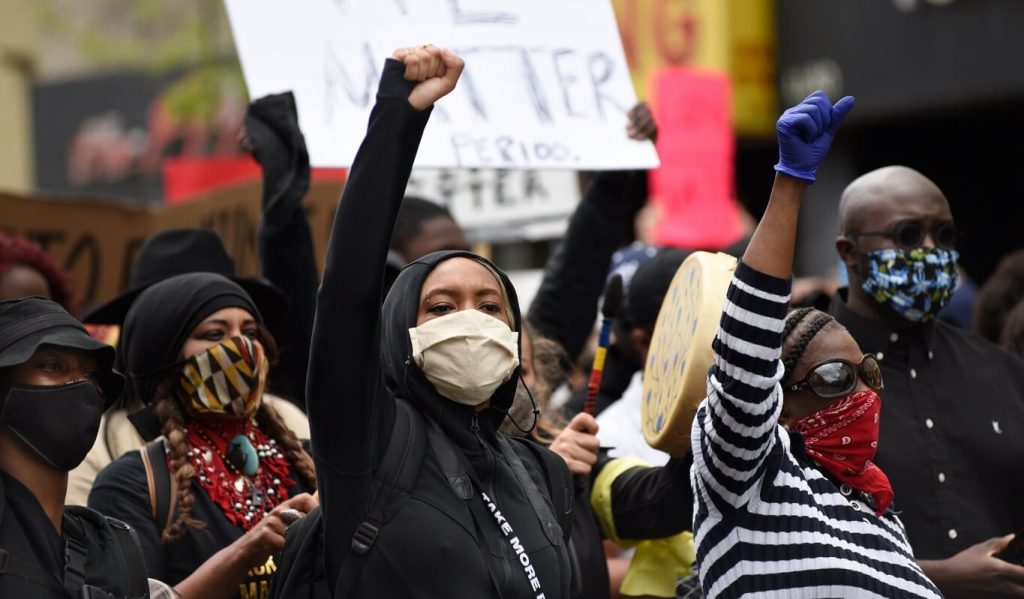Anti-racism and Justice, Equity, Diversity, Inclusion (JEDI) Policy
BACKGROUND
Oxfam Canada’s vision is that of a just and sustainable world, and our mission is to fight inequality and patriarchy to end poverty and injustice. We are a feminist organization with a deeply held conviction that ending poverty begins with women’s rights. We know that we cannot fight inequality, or end poverty or patriarchy, if we do not understand and challenge interlocking systems of oppression such as racism, colonialism, sexism, homophobia, transphobia, classism, ableism, xenophobia, ageism and other forms of injustice and discrimination, especially if they are present in our organization.
PURPOSE AND SCOPE
The purpose of this policy is to outline the organization's expectations when it comes to anti-racism and JEDI and provide direction to staff and the Board. This policy provides a framework that must be used when drafting or reviewing all other Oxfam Canada policies.
This policy should be used and read in conjunction with: the most recent Oxfam Canada Anti-Racism and JEDI Strategy and Action Plan; Oxfam Canada action plan in support of Indigenous Rights, the Oxfam Canada policies on Workplace Violence, Workplace Harassment and Workplace Accommodation, the Accessibility Ontario Disability Act policy any other policies and action plans that are created in relation to our feminist principles and related to decolonization.
Oxfam Canada adheres to the Ontario Human Rights Code, which supersedes this policy.
PRINCIPLE AND COMMITMENT
Oxfam Canada is committed to advance anti-racism, justice, equity, diversity, and inclusion (JEDI) in our culture, structures, policies, systems, programs, influencing and outreach work. Growing as an anti-racist, feminist and inclusive organization is a key priority of our 2021-2025 Strategic Framework, and we are actively working to identify, understand, and challenge all forms of oppression and exclusion within our organization. We recognize that Oxfam Canada will better reach its overall goals if it is successful in systematically identifying and removing barriers to full participation and bringing an intersectional lens to all aspects of our work.
Oxfam Canada will be guided by the principle that equity means more than treating people in the same way. Equity requires special measures that lead to equal opportunities and the accommodation of differences. Oxfam Canada will implement initiatives to prevent discriminatory and harmful behaviour and to eliminate systemic barriers to justice, equity, diversity and inclusion in our organization.
ACCOUNTABILITY
Oxfam is committed to a culture of accountability. This means preventing racial harm and other forms of discrimination, and providing proper redress to repair harm when it occurs. Accountability is essential to deepen trust and build a culture of belonging. The Oxfam Canada Board, Senior Management Team and staff are all responsible for holding themselves and each other accountable to the principles and commitments set out in this policy.
- The Board Anti-racism, Reconciliation, JEDI and Governance Committee ensures oversight and conducts regular reviews of this policy.
- The Executive Director and Deputy Executive Director are responsible for ensuring overall implementation of this policy. They will prepare and present an annual report to the Board and to staff.
- The internal staff Anti-Racism and JEDI Committee works with all Oxfam Canada departments to form annual anti-racism and JEDI plans. Each department will annually assess progress, identify emerging needs and priorities, and prepare a new set of action points, as appropriate.
- All Oxfam Canada staff are responsible for reading and understanding this Policy and their responsibilities within.
In addition to reporting to our Board and staff, Oxfam Canada will report publicly on its progress on our website.
ROLES AND RESPONSIBILITIES
All Oxfam Canada staff and Board members share the responsibility for creating an inclusive work environment and integrating a commitment to anti-racism and JEDI in how we work, what we work on and who we work with.
The Board of Directors has a responsibility to:
- Provide leadership in helping the organization fulfill its mission and goals relating to anti-oppression, anti-racism, gender justice and other JEDI practices.
- Ensure it fulfills the commitments set out in the Board Composition and Nomination Policy in term of diverse composition of the Board. This includes identifying and striving to overcome barriers that may prevent individuals from diverse communities from joining the Board and/or accessing Board spaces.
- Ensure the Board’s own ways of working, especially in terms of its deliberations and decision making, reflect Oxfam Canada’s commitment to JEDI and anti-racism.
- Ensure that JEDI and anti-racism considerations are included in the terms of reference of all Board Committees, including in work to develop and update Board-approved policies.
- Provide oversight and hold the Executive Director and Senior Management Team accountable for making progress on these commitments.
The Senior Management Team has a responsibility to:
- Articulate clear commitments in Oxfam Canada’s strategy to advance our anti-racism and JEDI agenda and provide direction and ensure required resources are available.
- Ensure the design and implementation of an annual work plan on anti-racism and JEDI, in alignment with Oxfam Canada’s strategy.
- Look critically at our systems, policies and practices, and their impact both internally and externally, to ensure they do not cause harm or reinforce bias and discrimination, but rather create access, opportunities and equitable outcomes.
- Measure progress on the implementation of anti-racism and JEDI strategies, programs and initiatives and report back to the Board, staff and the public, as appropriate.
- Promote and model a culture of respect, inclusion and belonging, and build strong staff buy-in for this work.
- Provide continuous learning opportunities for the Board and staff to deepen their awareness, understanding and skills in relations to JEDI and anti-racism.
- Investigate the ways in which staff experience the workplace to devise safe, equitable and inclusive work environments at all levels of the organization.
- Create safe spaces to normalize conversations on anti-racism and anti-oppression, and integrate an intersectional perspective into all we do.
All staff have a responsibility to:
- Foster a culture that is anti-racist and embraces JEDI.
- Acknowledge and address the biases, underlying beliefs and values, assumptions, and stereotypes that can negatively impact their work, their ways of working, and their interactions with others.
- Prioritize learning about anti-racism and JEDI and implement best practices in their work and in the way they relate with others.
- Welcome, embrace and foster positive, informed and inclusive attitudes towards colleagues.
- Ensure the perspectives and voices of members of society who face exclusion due to societal and systemic barriers inform decision-making.
DEFINITIONS
- Anti-oppression: Strategies and actions that actively challenge existing intersectional inequities and injustices.
- Anti-racism: The conscious, deliberative and on-going process of identifying, challenging, and changing the values, structures and behaviours that perpetuate systemic racism. Anti-racism is an approach, not an end-point, and thus provides a useful frame for an organizational change process.
- Belonging: is the feeling that comes from not only being in a group, but sensing that they belong in that group, that they are wholly accepted and appreciated for who they are, and that in the group they are safe to participate and that they truly matter to others.
- Bias: The conscious (explicit) or unconscious (implicit) opinion, preference, prejudice, or inclination formed without reasonable justification that prevents a balanced or even-handed judgement.
- Decolonization: It is an ongoing process that aims to deconstruct settler colonial ideologies such as white supremacy, give value to Indigenous knowledge, and dismantle power imbalances.
- Diversity: The wide array of differences among people and their perspectives on the world.
- Equity: Where advantage and disadvantage are not distributed on the basis of social identity factors. such as race and ethnicity
- Equity-denied people/groups: Refers to people/groups who, because of systemic discrimination, face barriers that prevent them from having the same access to the resources and opportunities that are available to other members of society, and that are necessary for them to attain just outcomes. Less preferred terms for these groups/people are “visible minorities” or “equity-deserving”.
- Feminism: At its most basic, feminism seeks to ensure that people of different genders and intersecting identities are equal in law and in practice. A feminist approach offers an inclusive way to help understand how diverse systems of hierarchy, power and subordination interact across social contexts. Its objective is to create positive futures that uphold the dignity and rights of all.
- Inclusion: Reflected in environments that enable diverse peoples to participate fully, be respected and feel valued.
- Patriarchy: it is system built around male privilege and dominant masculinities that perpetuate sexist and hierarchical power relationships. They legitimize the discrimination and exclusion of women and gender non-conforming people through harmful social norms, policies and institutions.
- Reconciliation: is about establishing and maintaining a mutually respectful relationship between First Nations, Métis and Inuit and settlers in Canada. In order for that to happen, there has to be awareness of the past, an acknowledgement of the harm that has been inflicted, atonement for the causes, and action to change behaviour.
- Systems of oppression: historical and organized patterns of that are woven into the very foundation of a culture, society, and laws and that contribute or reinforce the oppression of marginalized social groups while elevating dominant social groups.
- White supremacy: ideology that white people and their beliefs are superior to other races.
We recognize this is a limited list of definitions. For all other terms that are not defined here, we recommend to consult the Glossary of Terms created by the Canadian Center for Diversity and Inclusion.
Oxfam Land Acknowledgement Oxfam Canada acknowledges the historical and ongoing oppression and colonization of all Indigenous Peoples, cultures and lands in the place we now know as Canada. Photo: Chris…

Oxfam Canada has strengthened our commitments to advance anti-racism, diversity, equity and inclusion.

Over the past year, Oxfam has undertaken the following actions in support of becoming a more actively anti-racist organization.

Black Lives Matter We believe in a just world without poverty. We can’t fight inequality, or end poverty, if we don’t challenge racism. As a feminist organization, we are clear…